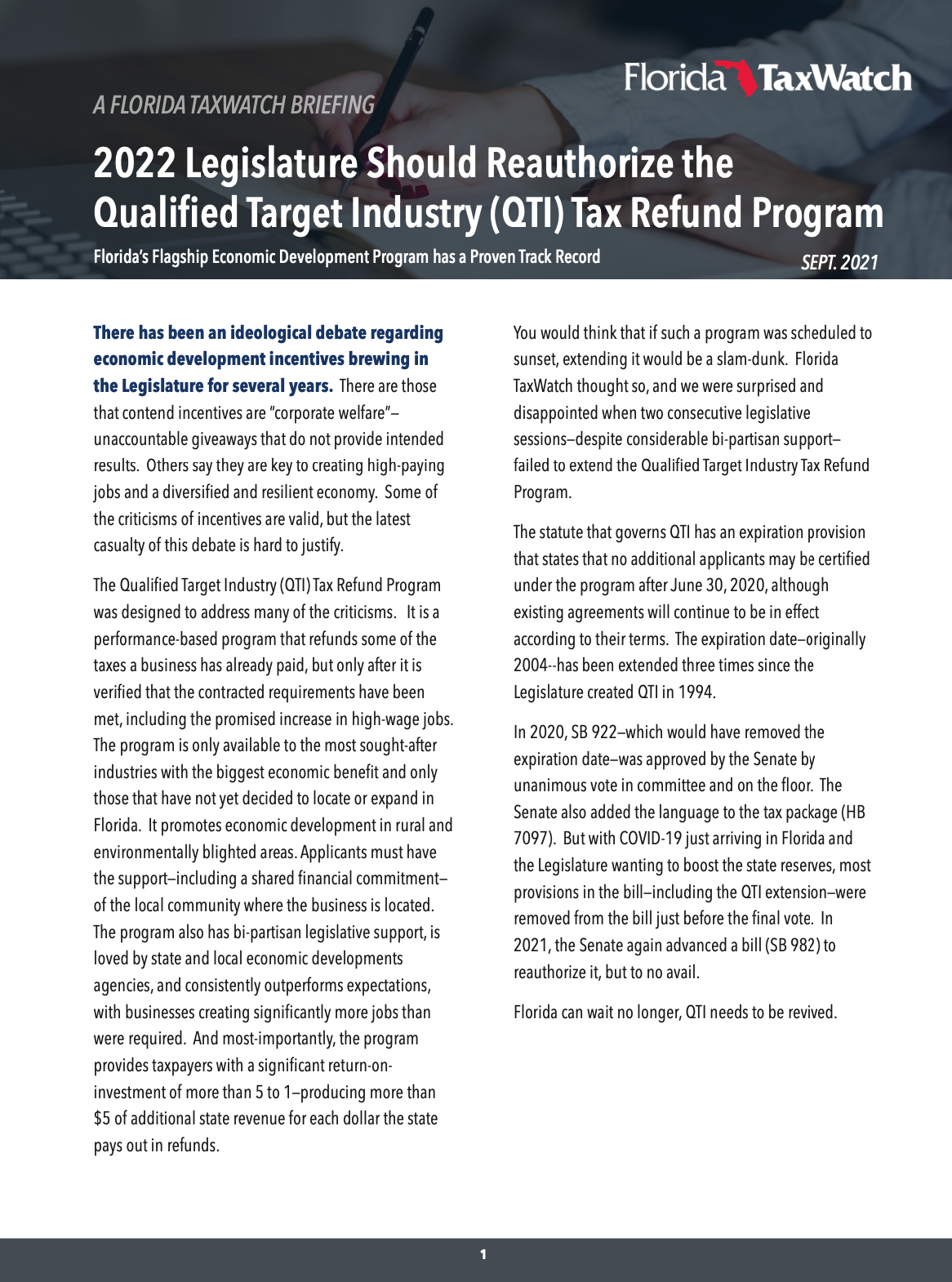2022 Legislature Should Reauthorize the Qualified Target Industry (QTI) Tax Refund Program
Florida’s Flagship Economic Development Program has a Proven Track Record

There has been an ideological debate regarding economic development incentives brewing in the Legislature for several years. There are those that contend incentives are “corporate welfare”— unaccountable giveaways that do not provide intended results. Others say they are key to creating high-paying jobs and a diversified and resilient economy. Some of the criticisms of incentives are valid, but the latest casualty of this debate is hard to justify.
The Qualified Target Industry (QTI) Tax Refund Program was designed to address many of the criticisms. It is a performance-based program that refunds some of the taxes a business has already paid, but only after it is verified that the contracted requirements have been met, including the promised increase in high-wage jobs. The program is only available to the most sought-after industries with the biggest economic benefit and only those that have not yet decided to locate or expand in Florida. The program also has bipartisan legislative support, is loved by state and local economic developments agencies, and consistently outperforms expectations, with businesses creating significantly more jobs than were required. And most importantly, the program provides taxpayers with a significant return-on-investment of more than 5 to 1—producing more than $5 of additional state revenue for each dollar the state pays out in refunds. Despite this, the Qualified Target Industry Tax Refund Program has not been extended the last two legislative sessions.
The 2013 Florida Legislature instituted a process to review the state’s economic development programs by, in part, calculating each programs’ return-on-investment (ROI). There have been three review cycles completed for the QTI Tax Refund Program, with reports issued in 2014, 2017, and 2020. The evaluations show the QTI program has provided the state with a “steady and robust” ROI. In fact, it has the highest ROI of any of the economic development programs in the three-year review cycle. The latest ROI for QTI is 5.3, meaning for every dollar of state investment (tax refunds), the state receives $5.30 in added state tax revenue (see table in report).
Florida’s economic development professionals strongly support QTI:
- Jamal Sowell, Florida’s Secretary of Commerce and the President and CEO of Enterprise Florida, Inc. (EFI), credits QTI with playing a big role in the growth and diversification of the state’s manufacturing sector.
- Panelists at a program held by the Florida Economic Development Council13 bemoaned the loss of QTI, saying that Florida is now “out of the game” when it comes to attracting new business from out of state and that despite Florida’s many business climate assets, it cannot compete with incentives offered by states like Texas, Tennessee, Georgia, and North Carolina.
- An aerospace representative noted that one in four businesses are currently considering relocating their operations. “Florida needs to either seize this opportunity or it will pass us by,” he said. “It is a transformational time, and we need to seize the moment. This will affect Florida for decades.
- Recently, Florida—specifically Tampa—lost two “mega projects” to North Carolina—Honeywell’s global headquarters and health care giant Centene’s massive new campus—over a million square feet of office space and more than 3,200 jobs. While there were many other factors involved, the loss of QTI likely played a role.
- Area Development magazine publishes information on corporate site selection and relocation. In its latest survey, state and local incentives rank ninth in importance but 77 percent of corporate executives rate them as a “very important” or “important” consideration in site selection.
- EDR performed a review of the research on site selection factors and concluded: “Survey research and professional opinions indicate that incentives are not likely to be a primary consideration in site selection. However, practitioners indicate it can be a disqualifying factor at the initial stage (a fatal flaw) and may be a deciding factor or the deciding factor at the final stage.”
- Florida TaxWatch agrees with the Department of Economic Opportunity—” Florida has lost a heavily utilized and successful economic development tool at an inopportune time.
The competition among states in attracting businesses is fierce, Florida has many attributes that companies find attractive, but so do other states. Incentives are simply one tool in the economic development arsenal of a state government. Economic development incentives are not a substitute for the fundamentals of good economic growth, like a well-trained workforce or a good tax structure, but they cannot be ignored as a part of the overall strategy for economic development.
Overall, the QTI program was a very successful tool for Florida’s economic development and provided a significant positive return-on-investment to the state. The 2022 Legislature should reauthorize the QTI program.